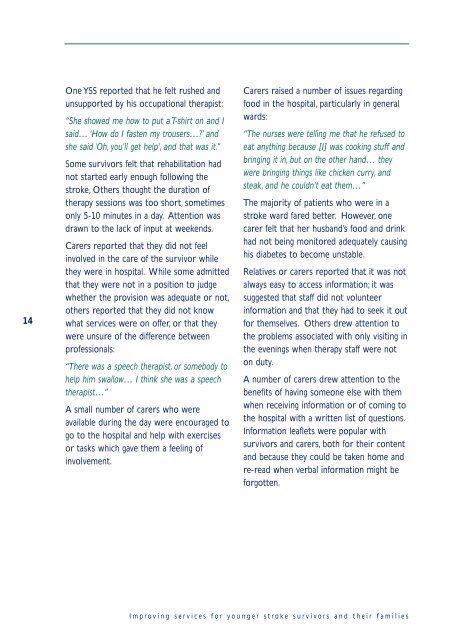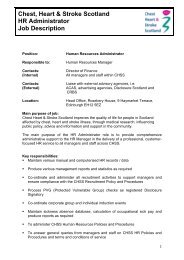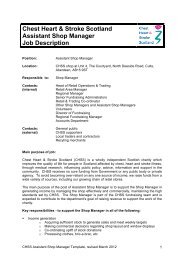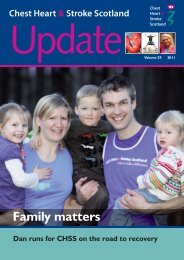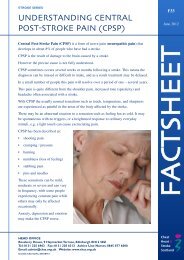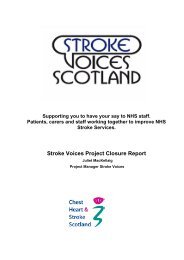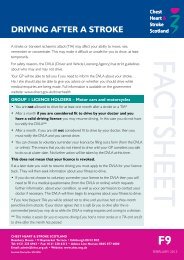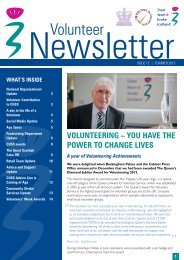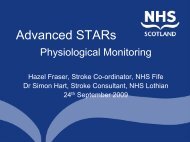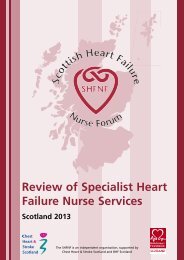Improving services for younger stroke survivors and their families
Improving services for younger stroke survivors and their families
Improving services for younger stroke survivors and their families
- No tags were found...
You also want an ePaper? Increase the reach of your titles
YUMPU automatically turns print PDFs into web optimized ePapers that Google loves.
14One YSS reported that he felt rushed <strong>and</strong>unsupported by his occupational therapist:“She showed me how to put a T-shirt on <strong>and</strong> Isaid… ‘How do I fasten my trousers…?’ <strong>and</strong>she said ‘Oh, you’ll get help’, <strong>and</strong> that was it.”Some <strong>survivors</strong> felt that rehabilitation hadnot started early enough following the<strong>stroke</strong>, Others thought the duration oftherapy sessions was too short, sometimesonly 5-10 minutes in a day. Attention wasdrawn to the lack of input at weekends.Carers reported that they did not feelinvolved in the care of the survivor whilethey were in hospital. While some admittedthat they were not in a position to judgewhether the provision was adequate or not,others reported that they did not knowwhat <strong>services</strong> were on offer, or that theywere unsure of the difference betweenprofessionals:“There was a speech therapist, or somebody tohelp him swallow… I think she was a speechtherapist…”A small number of carers who wereavailable during the day were encouraged togo to the hospital <strong>and</strong> help with exercisesor tasks which gave them a feeling ofinvolvement.Carers raised a number of issues regardingfood in the hospital, particularly in generalwards:“The nurses were telling me that he refused toeat anything because [I] was cooking stuff <strong>and</strong>bringing it in, but on the other h<strong>and</strong>… theywere bringing things like chicken curry, <strong>and</strong>steak, <strong>and</strong> he couldn’t eat them…”The majority of patients who were in a<strong>stroke</strong> ward fared better. However, onecarer felt that her husb<strong>and</strong>’s food <strong>and</strong> drinkhad not being monitored adequately causinghis diabetes to become unstable.Relatives or carers reported that it was notalways easy to access in<strong>for</strong>mation; it wassuggested that staff did not volunteerin<strong>for</strong>mation <strong>and</strong> that they had to seek it out<strong>for</strong> themselves. Others drew attention tothe problems associated with only visiting inthe evenings when therapy staff were noton duty.A number of carers drew attention to thebenefits of having someone else with themwhen receiving in<strong>for</strong>mation or of coming tothe hospital with a written list of questions.In<strong>for</strong>mation leaflets were popular with<strong>survivors</strong> <strong>and</strong> carers, both <strong>for</strong> <strong>their</strong> content<strong>and</strong> because they could be taken home <strong>and</strong>re-read when verbal in<strong>for</strong>mation might be<strong>for</strong>gotten.<strong>Improving</strong> <strong>services</strong> <strong>for</strong> <strong>younger</strong> <strong>stroke</strong> <strong>survivors</strong> <strong>and</strong> <strong>their</strong> <strong>families</strong>


